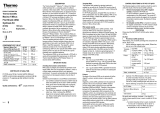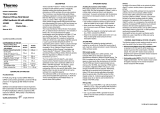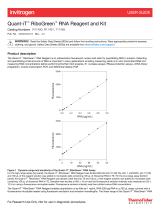Page is loading ...

Protocol
Avoiding RNase Contamination
Reagents have been tested to ensure they are endo-,
exodeoxyribonuclease, ribonuclease, and phosphatase
free. However, an RNase-free working environment
and RNase-free solutions are also critical factors for
performing successful in vitro transcription.
General recommendations to avoid RNase contamination:
• Maintain a separate area, dedicated pipettors and
reagents when working with RNA.
• Wear gloves when handling RNA and reagents to avoid
contact with skin, which is a source of RNases. Change
gloves frequently.
• Use sterile RNase free plastic tubes.
• Treat water and all solutions used for RNA purication
and handling with DEPC. Add DEPC to 0.1% (v/v)
nal concentration; incubate overnight at room
temperature and autoclave.
• High quality reagents must be used for buffer solutions.
Buffers containing Tris should be prepared by dissolving
Tris base in DEPC-treated water. Solutions containing
DTT or nucleotides should be prepared by dissolving in
DEPC-treated water and passing the solution through a
0.2 µm lter to sterilize.
• Keep all kit components sealed when not in use and all
tubes tightly closed during the transcription reaction.
North America
Technical Services:
techservice.genomics@thermofisher.com
Customer Services:
customerservice.genomics@
thermofisher.com
Tel 800 235 9880
Fax 800 292 6088
Europe and Asia
Technical Services:
techservice.emea.genomics@
thermofisher.com
Customer Services:
customerservice.emea.genomics@
thermofisher.com
thermoscientific.com
© 2012 Thermo Fisher Scientic Inc. All rights reserved. All trademarks are the property of Thermo Fisher Scientic Inc. and its subsidiaries. Specications,
terms and pricing are subject to change. Not all products are available in all countries. Please consult your local sales representative for details.
This protocol is for Avoiding RNase Contamination
/










